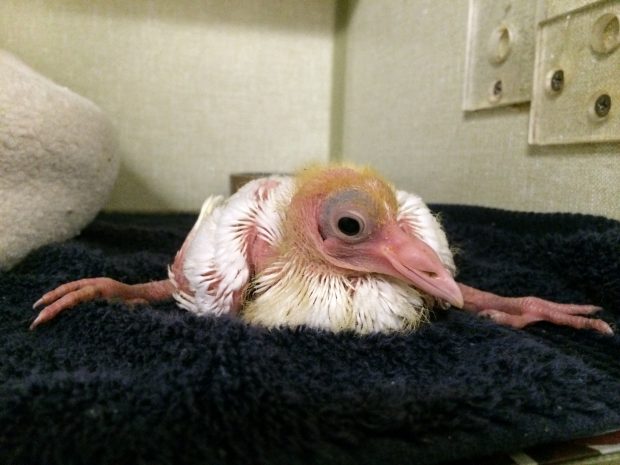Guest post by Sammy Mikus
(with extra stuff from Elizabeth)
Egg-laying & Fake Eggs
When bonded, a female pigeon will usually lay two eggs approximately every four weeks. Year round. If fertile but not removed and replaced with fakes (feggs), the eggs will hatch in 18 days, and the babies will leave the nest (fledge) at around four weeks which is when the parents stop caring for them and want the youngsters out of their area. Pigeons reach sexual maturity around four to six months which means that, unless every real egg is removed, you’re going to have a lot of pigeons very quickly! Keep in mind that all the offspring will breed, too; yes, a brother-sister (or even a parent-youngster) pair will breed and produce offspring! (All of this applies to doves as well except on a faster time schedule. Dove eggs hatch in 14 days, doves lay two eggs every three weeks and doves mature at about three months old.)
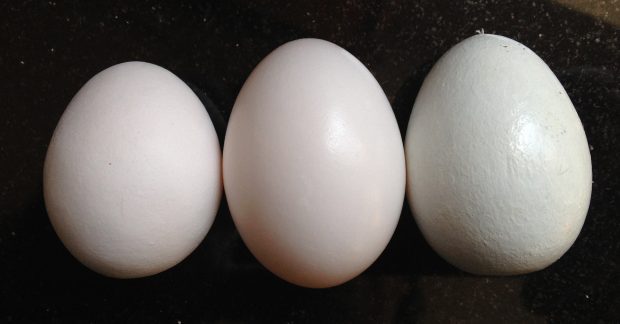
Porcelain fegg, real egg, wooden fegg
Pigeons aren’t spayed or neutered and will bond and lay eggs despite the most challenging conditions. The solution? You must remove and destroy (by freezing or breaking) every real egg at three to five days after they are laid (while cells are still organizing and before the chick is formed). And, to keep your pigeons content, replace them with feggs. You can buy (or make) fake eggs. Feggs don’t fool pigeons and they don’t prevent egg-laying. The feggs just allow pigeons to have the pleasure of nest-building and egg-sitting (both of which they really enjoy) without hatching more pigeons, upsetting the pair’s relationship and/or harming the health of the laying female who will lay more too quickly if her real eggs are just removed without replacements. Leave the feggs until the sitting pigeons lose interest and quit the nest to have a honeymoon week. Always monitor what your pigeons are sitting on! Check what they are sitting on frequently. Pigeons will sometimes lay an extra egg or even two more without ever quitting their feggs. Check nests thoroughly. Pigeons will occasionally bury the real or fake eggs in their nest, so be thorough to make sure you haven’t missed any. Only freezing or boiling or breaking will interrupt the eggs’ development. Eggs that have been refrigerated, shaken (addled), cracked, etc. can still hatch, so best to use feggs.

A real egg has been laid in the nest right beside the fakes. Always know what your pigeons are sitting on and remove every real egg! Photo credit Sammy Mikus
I also strongly recommend replacing suspected infertile eggs, too, since they can sometimes surprise you. If you have a male pigeon (or a pigeon whose gender you aren’t 100% sure of), even if the laying female is bonded to another female or bonded to a person. I’ve seen and heard of many cases of a female pigeon mating with a male she isn’t bonded with. Also, a female pigeon may have a past; she could’ve mated with a male in a previous home over a month ago and still lay fertilized eggs.
Won’t My Pigeons Hate Me?
Pigeons are understandably territorial about their nests and protective of their eggs (or feggs). Most will puff up big, glare, posture, wing whack and even bite your tresspassing hand. (Their courage is impressive. They stand their ground to protect their eggs.) That is all normal and while it will probably hurt your feelings, it won’t hurt you physically. (Pigeons’ beaks and jaws are so weak they are literally called soft bills, unlike parrots who are called hook bills.) Pigeons don’t like it when we check under them to see what they are sitting on and trade their real eggs for fakes but they tolerate it as just another of many strange things that their human friends do. Pigeons are very forgiving and all about the present. While mad in the moment, they’ll resume loving (or learning to love) you when its done.
Will My Pigeons Get Depressed?
No, sitting on fake eggs will not make your pigeons depressed. And it is unsustainable to let them hatch their eggs! They will continue to lay eggs after hatching and raising a clutch, often laying new eggs while the young are still in the nest. Pigeons don’t have to have babies to be happy and fulfilled. They find joy in nesting and being with their mate, but usually don’t have much affection for their offspring after they’re four weeks old.
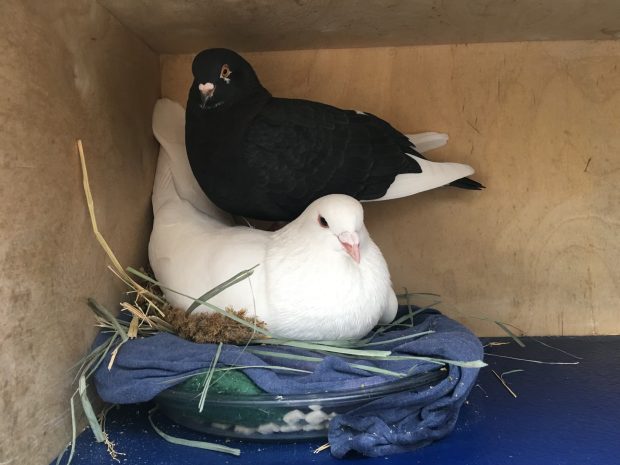
Pigeon pairs all have their own style of nest-sitting. (Wink & Yuzu by Shae Irving)
What Can Go Wrong?
If pet pigeons are allowed to hatch their eggs, there’s a lot that can go wrong. While many pigeons are great parents, not all of them are. First-time parents in particular often make mistakes. If one or both of the babies end up being abandoned by the parents, the human caretaker will have to step in and raise them. Keep in mind that pigeon hatchlings are very frail and hard to successfully raise, especially for someone who isn’t knowledgeable.
Allowing pet pigeons to breed can also result in the offspring hatching with genetic issues (such as splay leg) that could result in permanent disability and/or an expensive trip to the vet. (See Sugar’s story.) Anyone allowing their pet pigeons to breed should be fully prepared to take the fragile babies to the vet if something goes wrong. And be committed to providing them a safe and happy home for approximately 10+ years. (There isn’t any room for your unwanted pigeons. Every rescuer is beyond full.)
Speaking of the vet, it’s important to know that raising babies is hard on pigeon parents, especially more fragile domestic breeds or birds with disabilities. Feeding, sitting on, and protecting the babies stresses the parents and lowers their immune system, which means it’s easier for them to get sick or have issues with an overload of parasites.
Remember— those cute baby pigeons will grow up and behave like adults in less than 2 months! And they will take up the same amount of space as any other adult pigeon. I’ve heard countless stories of babies growing up to bully their parents. (If you can’t handle another two male pigeons, you definitely shouldn’t be thinking about letting your pigeons hatch their eggs!) Most pigeons lose their attachment to their offspring pretty quick; they will not be able to share a cage with them.
See Sammy’s original post on Instagram
More info:
Video showing how to swap out real eggs for feggs
Download our hatch prevention handout
How to Welcome Pigeons into Your Life
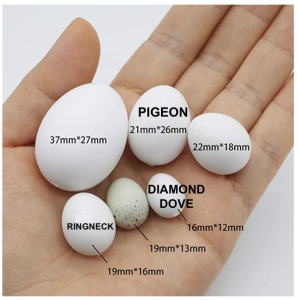
Fake egg sizes
Palomacy Position On Egg-Laying & Reproductive Health:
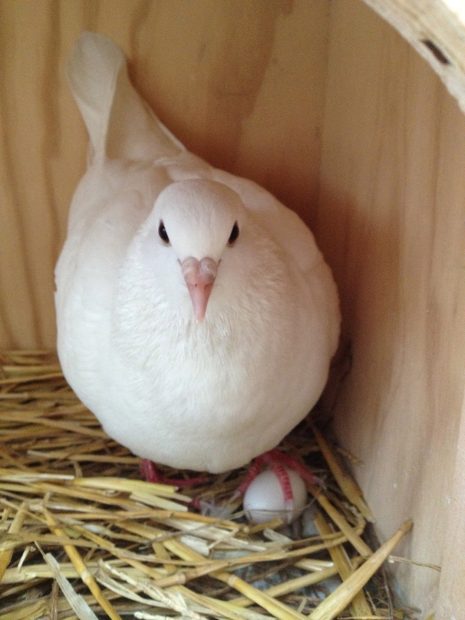
Olivia said, My egg! (Photo credit Elizabeth Young)


